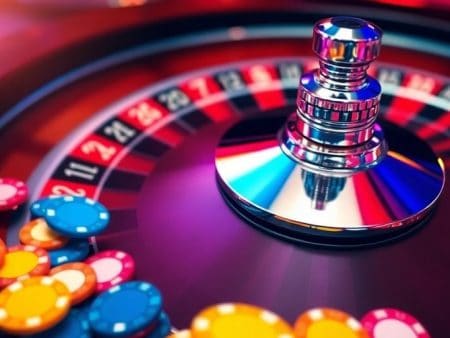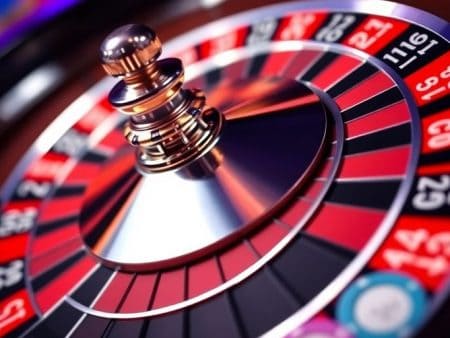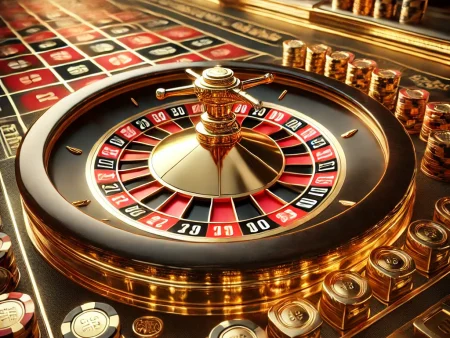Roulette is a game that combines excitement and unpredictability, but understanding the chances involved can help you make smarter bets. In 2025, players can enhance their winning potential by learning about various strategies and game mechanics. This article will break down the essential elements of roulette chance and provide insights into how to optimize your gameplay for better results.
Key Takeaways
- Familiarize yourself with the different types of roulette and their odds, as this can significantly impact your chances of winning.
- Popular betting strategies like Martingale and Fibonacci can help manage your bankroll, but remember they don’t guarantee wins.
- European Roulette has a lower house edge than American Roulette, making it a better choice for players seeking better odds.
- Always set a budget before playing and stick to it to ensure responsible gambling and prevent losses.
- Utilizing bonuses and understanding game variations can enhance your overall gaming experience and increase your potential payouts.
Exploring Roulette Chance Mechanics
Roulette is often seen as a game of pure luck, but understanding the underlying mechanics can give you a better grasp of your chances. It’s not about predicting the future, but about knowing the odds and making informed decisions. Let’s take a look at some key aspects.
Understanding Random Number Generation
At the heart of roulette lies the concept of randomness. In online roulette, this randomness is achieved through RNG (Random Number Generators). These are algorithms designed to produce sequences of numbers that appear statistically random. Each spin is an independent event, meaning the outcome of previous spins has no impact on future spins. This is important to remember, as it dispels the myth of "hot" or "cold" numbers. While patterns might appear in the short term, over a large sample size, each number has an equal chance of being selected. It’s all about probability, not destiny.
The Role of House Edge
The house edge is the built-in advantage the casino has in any roulette game. It represents the percentage of each bet that the casino expects to keep over the long run. The house edge varies depending on the type of roulette you’re playing. For example:
| Roulette Type | House Edge |
|---|---|
| European Roulette | 2.70% |
| American Roulette | 5.26% |
Understanding the house edge is important because it shows you the long-term expectation of your bets. While short-term wins are possible, the house edge ensures that the casino will profit over time. Choosing games with a lower house edge, like French Roulette, can improve your odds.
Impact of Wheel Variants
The specific type of roulette wheel significantly impacts your odds. The main difference lies in the presence of the "0" and "00" slots. European roulette has a single "0", while American roulette has both "0" and "00". This seemingly small difference dramatically increases the house edge in American roulette.
Here’s a breakdown:
- European Roulette: Offers better odds due to the single zero.
- American Roulette: Has a higher house edge because of the additional double zero.
- French Roulette: Similar to European, but with additional rules like "La Partage" and "En Prison" that can further reduce the house edge on even-money bets. These rules return half your bet or give you another spin if the ball lands on zero, respectively.
Popular Strategies to Enhance Winning Odds
Roulette is a game of chance, but that doesn’t mean you can’t use strategies to manage your bets and, hopefully, improve your outcomes. It’s important to remember that no strategy can guarantee a win, but some approaches can help you play smarter and potentially minimize losses. Let’s explore some popular betting systems.
Martingale System Explained
The Martingale system is probably the most well-known roulette strategy. The basic idea is that you double your bet after every loss. The theory is that when you eventually win, you’ll recover all your previous losses plus win a profit equal to your original bet.
Here’s how it works:
- Start with a small, comfortable bet.
- If you lose, double your bet for the next round.
- Continue doubling until you win.
- After a win, return to your original bet size.
While it sounds foolproof, the Martingale system has a major drawback: it requires a large bankroll. Losing streaks can quickly lead to very high bets, potentially exceeding table limits or depleting your funds. It’s a high-risk, high-reward strategy that’s not suitable for everyone. If you are looking for quick recovery of losses, this might be the strategy for you.
Paroli and Reverse Martingale
The Paroli system, also known as the Reverse Martingale, is the opposite of the Martingale. Instead of doubling your bet after a loss, you double it after a win. The goal is to capitalize on winning streaks. After three consecutive wins or a loss, you reset to the base bet. This system is designed for players seeking to maximize gains during hot streaks with minimal risk.
Here’s a quick breakdown:
- Start with a base bet.
- Double your bet after each win.
- After three consecutive wins or a loss, reset to the base bet.
The Paroli system is less risky than the Martingale because you’re only increasing your bets when you’re winning. However, it also means that your potential profits are limited. It relies heavily on consecutive wins, which are rare. Losing early can negate gains. It’s best for risk-averse players who want a low-pressure system.
Fibonacci Betting Strategy
The Fibonacci system is based on the Fibonacci sequence (1, 1, 2, 3, 5, 8, 13, 21, etc.), where each number is the sum of the two preceding numbers. In roulette, you use this sequence to determine your bet size. After a loss, move to the next number in the sequence. After a win, move back two numbers. This is a more conservative approach than the Martingale, as the bet increases more slowly. It may be beneficial in order to go with a bet that features great odds plus start your bets at the desk minimum. In roulette, we suggest proceeding with something similar to odds/evens or red/black.
Here’s how to use the Fibonacci system:
- Start with a bet of 1 unit.
- If you lose, move to the next number in the sequence and bet that amount.
- If you win, move back two numbers in the sequence and bet that amount.
- If you are at the beginning of the sequence (1, 1), stay at 1 unit.
The Fibonacci system is safer than the Martingale due to slower progression of bets. However, extended losing streaks can still lead to high bets, and it requires careful tracking. It’s best for players with moderate risk tolerance who appreciate structured play. Stick to even-money bets and start with a low base unit to avoid high losses.
Choosing the Right Roulette Game
It’s easy to think all roulette games are the same, but picking the right one can really change your experience. Different versions have different odds, and some even have special rules that can help you out. It’s worth taking a little time to understand the differences before you play roulette at Stake.com.
European vs. American Roulette
The big difference here is the wheel. European roulette has one zero (0), while American roulette has a zero and a double zero (00). That extra double zero in American roulette increases the house edge, making it harder for you to win. Here’s a quick comparison:
| Feature | European Roulette | American Roulette |
|---|---|---|
| Number of Zeros | 1 (0) | 2 (0, 00) |
| House Edge | ~2.7% | ~5.26% |
| Winning Chances | Higher | Lower |
As you can see, European roulette gives you a better shot. If you have the choice, go with European.
Understanding French Roulette
French roulette is similar to European roulette, but it has two extra rules that can be beneficial: "La Partage" and "En Prison." La Partage means that if you make an even-money bet (like red/black or odd/even) and the ball lands on zero, you get half your bet back. En Prison is similar, but instead of getting half back, your bet stays on the table for the next spin. If your bet wins on the next spin, you get your whole bet back. These rules lower the house edge even further, making French roulette a good choice if you can find it.
French Roulette is often overlooked, but those special rules can really make a difference. Look for tables that offer La Partage or En Prison to improve your odds.
Identifying the Best Betting Limits
Roulette tables have minimum and maximum betting limits. These limits can affect your strategy. If you’re using a strategy like the Martingale (where you double your bet after a loss), you need to make sure the table’s maximum bet is high enough to allow you to keep doubling. On the other hand, if you have a small bankroll, you’ll want to find tables with low minimum bets so you can play longer. Here are some things to consider:
- Bankroll Size: A larger bankroll allows for higher betting limits.
- Betting Strategy: Some strategies require specific betting ranges.
- Risk Tolerance: Higher limits mean higher potential wins (and losses).
It’s all about finding a table where the limits match your budget and your playing style. Don’t get stuck at a table where you can’t execute your roulette strategy tips effectively.
Factors Influencing Roulette Betting Success
Player Experience and Strategy Selection
Your experience level plays a big role in how well a roulette strategy works for you. A beginner might struggle with complex systems like the Fibonacci, while a seasoned player can handle the nuances. Choosing a strategy that matches your understanding and comfort level is key. It’s not just about picking a system; it’s about knowing how to use it effectively. Some things to consider:
- Do you understand the math behind the strategy?
- Can you quickly calculate bets under pressure?
- Are you comfortable with the risk involved?
Time Management During Play
How long you play can impact your results. Short sessions might favor aggressive strategies aiming for quick wins, while longer sessions might benefit from more conservative approaches. Fatigue can lead to poor decisions, so it’s important to manage your time wisely. Here’s a simple breakdown:
- Set a time limit before you start.
- Take regular breaks to clear your head.
- Avoid playing when you’re tired or distracted.
It’s easy to get caught up in the excitement of roulette, but remember that time is a factor. The longer you play, the more likely the house edge will work against you. Knowing when to walk away is just as important as knowing when to bet.
Understanding Betting Ranges
The table’s betting limits can restrict your strategy. For example, the Martingale system, which involves doubling your bet after each loss, can quickly run into the maximum bet limit, preventing you from recovering your losses. It’s important to choose tables with betting ranges that align with your strategy and bankroll. Consider these points:
- What’s the minimum bet?
- What’s the maximum bet?
- How does the betting range affect your strategy’s progression?
Understanding betting ranges is important for any player. You need to know how the table limits will affect your gameplay. If you’re using a strategy that requires increasing bets, make sure the table allows for it. Otherwise, you might find yourself stuck and unable to continue your strategy.
Responsible Gambling Practices
Roulette can be a fun game, but it’s super important to keep things in check. It’s easy to get carried away, and before you know it, you might be in over your head. Let’s talk about some ways to make sure you’re gambling responsibly and keeping it a good time.
Setting a Budget
Before you even think about placing a bet, decide how much money you’re okay with potentially losing. Seriously. This isn’t money you need for rent, bills, or groceries. Think of it as entertainment money, like going to the movies or a concert. Once you’ve hit that limit, you’re done. No exceptions. It’s easy to say "just one more spin," but that’s how problems start.
- Determine your disposable income.
- Allocate a specific amount for gambling.
- Track your spending to stay within budget.
Recognizing When to Stop
Knowing when to walk away is just as important as setting a budget. If you’re on a winning streak, it can be tempting to keep going, thinking you’re invincible. But the odds always catch up eventually. And if you’re losing, it’s even harder to stop, because you want to win back what you’ve lost. But chasing losses is a recipe for disaster.
The best time to stop gambling is when you’re still having fun. If it starts to feel like a chore, or if you’re getting stressed or anxious, it’s time to take a break. There are resources available to help with problem gambling, so don’t hesitate to reach out if you need it.
Avoiding Chasing Losses
This is a big one. Chasing losses means trying to win back the money you’ve already lost by betting even more. It’s a really bad idea. The more you try to win back, the more likely you are to make impulsive decisions and lose even more. It’s a vicious cycle. Instead of trying to recoup losses immediately, accept them as part of the game and stick to your original budget.
Here’s a simple way to think about it:
- Acknowledge the loss.
- Resist the urge to bet more.
- Stick to your pre-set budget and strategy.
Maximizing Your Gameplay Experience
Utilizing Bonuses Effectively
Okay, so you’re looking to get the most out of your roulette experience? One of the easiest ways to do that is by grabbing those bonuses casinos throw your way. But don’t just jump at any offer. Read the fine print! Wagering requirements can be a real buzzkill. You might think you’re getting free money, but if you have to bet it 50 times before you can withdraw anything, it might not be worth it. Look for bonuses with lower wagering requirements or ones that apply specifically to table games like roulette. Some casinos even offer bonuses tailored for live dealer games, which can be a sweet deal.
- Always read the terms and conditions.
- Check the wagering requirements.
- See if the bonus applies to roulette.
Choosing the Right Betting Style
There’s no one-size-fits-all when it comes to betting styles. Are you a risk-taker, or do you prefer to play it safe? Your personality should influence your approach. If you’re conservative, stick to even-money bets like red/black or odd/even. If you’re feeling bold, maybe try some inside bets with higher payouts. Also, consider your bankroll. Don’t bet more than you can afford to lose, and adjust your stake size accordingly. Some people swear by the Martingale System, but remember that it can be risky if you hit a losing streak. The best betting style is one that aligns with your risk tolerance and bankroll management strategy.
Finding the right betting style is a journey. Experiment with different approaches, track your results, and see what works best for you. Don’t be afraid to adjust your strategy as you gain experience and learn more about the game.
Engaging with Live Dealer Games
Want to take your roulette experience to the next level? Try live dealer games. It’s like being in a real casino without leaving your house. You get to interact with a real dealer, watch the wheel spin in real-time, and chat with other players. It adds a social element that’s missing from regular online roulette. Plus, some live dealer games offer unique features like side bets or different camera angles. It’s a great way to spice things up and make the game more engaging. Just make sure you have a stable internet connection, because nobody wants to see you lag out mid-spin. Video poker’s strategy-based gameplay enhances the general gaming experience.
Here’s a quick comparison of live dealer roulette vs. online roulette:
| Feature | Live Dealer Roulette | Online Roulette |
|---|---|---|
| Real Dealer | Yes | No |
| Real-Time Action | Yes | Simulated |
| Social Interaction | Yes | Limited |
| Atmosphere | More Authentic | More Convenient |
Analyzing Long-Term Roulette Strategies
Evaluating Risk vs. Reward
Okay, so you’re thinking about playing roulette for the long haul? That’s cool, but you gotta think about risk versus reward. It’s not just about winning a few bucks here and there; it’s about how much you’re willing to lose to potentially win something bigger. Some strategies might give you small, consistent wins, but they also come with the risk of bigger losses if you hit a bad streak. Others might offer the chance for huge payouts, but those are usually balanced with a higher chance of losing your shirt. It’s all about finding that sweet spot where you’re comfortable with the risk involved.
Adjusting Strategies Based on Outcomes
So, you’ve picked a strategy, and you’re playing. Great! But don’t just blindly stick to it if it’s not working. Roulette is random, but you can still learn from your results. Are you consistently losing with a certain approach? Maybe it’s time to tweak it or try something completely different. Keep a record of your bets and outcomes. This helps you see what’s working and what’s not. It’s like being a scientist, but with more spinning wheels and less lab coats. Remember to consider the betting limits of the table, as they can affect how well your strategy works.
The Importance of Consistency
Okay, I know I just said to adjust your strategy, but hear me out. While you need to be flexible, consistency is also key. Jumping from one strategy to another after every loss is a recipe for disaster. Give your chosen strategy a fair shot. Stick with it for a reasonable amount of time and number of spins before deciding it’s not for you. This lets you see if the strategy actually works in the long run, or if you’re just having a run of bad luck. Think of it like this:
- Choose a strategy that fits your risk tolerance and bankroll.
- Track your results carefully.
- Adjust your approach gradually, based on data, not emotions.
It’s important to remember that no strategy can guarantee wins in roulette. The house always has an edge. The goal is to manage your bankroll effectively and make the game more enjoyable, not to become a millionaire overnight.
Final Thoughts on Roulette Strategies
In the end, roulette is a game of chance, and while no strategy can guarantee a win, understanding the different approaches can help you play smarter. Whether you choose to go with the Martingale, Paroli, or any other method, remember that the house always has an edge. It’s all about having fun and managing your bankroll wisely. Play responsibly, set limits, and enjoy the thrill of the game. After all, the excitement of roulette comes from the spin of the wheel and the hope of hitting that lucky number.
Frequently Asked Questions
What is the basic idea of roulette?
Roulette is a casino game where players bet on where a ball will land on a spinning wheel. The wheel has numbered slots, and players can bet on specific numbers, colors, or groups of numbers.
How does the house edge affect my chances of winning?
The house edge is the advantage the casino has over players. In roulette, this means that the casino is more likely to win in the long run. Choosing games with a lower house edge, like European roulette, can improve your chances.
What are some popular betting strategies for roulette?
Some common strategies include the Martingale system, where you double your bet after a loss, and the Fibonacci strategy, which uses a number sequence to decide bets. These strategies can help manage your bets but don’t guarantee wins.
Is it better to play European or American roulette?
European roulette is generally better for players because it has only one zero, giving it a lower house edge compared to American roulette, which has both a single and a double zero.
How can I gamble responsibly while playing roulette?
Set a budget for how much money you are willing to spend and stick to it. It’s also important to know when to stop playing, especially if you’re losing.
What should I consider when choosing a roulette game?
Look at the type of roulette, the house edge, the betting limits, and whether you prefer online or live dealer games. Each of these factors can affect your gaming experience and chances of winning.


















